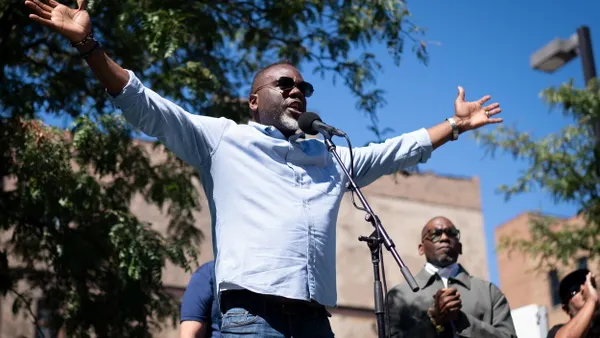NEW YORK — Bob Bennett wants cities to know that becoming "smart" is a necessity, and he's ready to help them get there.
The former chief innovation officer of Kansas City, MO announced this week at Smart Cities New York the launch of a smart city consulting group, B2 Civic Solutions, to help bridge gaps between local governments and private sector companies, and ensure citizen demands are at the center of such collaborations.
"Somebody needs to be able to teach [tech companies] how to speak city. Because, God love them, most of them are engineers. They don't speak city," Bennett said in an interview with Smart Cities Dive when discussing his motivation for starting the group. "And someone needs to be able to talk to the city side and articulate that this isn't a luxury anymore. That smartification is a requirement ...Someone needs to create that middleware to get these two entities together."
He said citizen expectations in cities nationwide are "outrunning the capacity of either side to deliver," and the only way to meet those expectations will be to connect the public and private sector in a way that efficiently identifies citizen-centric smart city solutions. B2 Civic Solutions has already named internet of things (IoT) company Smart City Media, lighting solution company Cimcon Lighting, and the city of Parkville, MO as inaugural clients.
"There is no one entity that can do this. Both sides have to kind of get off their high horse a little bit as to what their expectations have been in the past."

Bob Bennett
Founder, B2 Civic Solutions
Bennett is imparting his wisdom gained over more than three years as Kansas City's CIO, a role he transitioned out of as his appointor, Mayor Sly James, faces the end of his term in June. When asked what lessons he's taking from Kansas City, he pointed to a main mantra: partnerships are the key to success.
"There is no one entity that can do this. Both sides have to kind of get off their high horse a little bit as to what their expectations have been in the past," Bennett said. "You can't be a vendor anymore if you're a private sector entity.You have to be a partner. And if you're a city, you have to accept the fact that you don't have all of the answers and you can't control your space. You can only lend it as part of a partnership to bring those capabilities to town."
Those capabilities range from access to 5G, to micromobility and smart lighting infrastructure, all pushing cities toward increased resiliency and connectivity. Bennett also mentioned smart water systems are likely to rise in importance, as they're currently the least-disrupted municipal systems, despite their necessity alongside electricity and transportation. Bennett mentioned Akron, OH and Washington, DC as two cities that are leading the charge in deploying smart water infrastructure.
In fact, Bennett has kept a close eye on many cities nationwide during his time in Kansas City, and suggests others do the same, as it will help decision makers gather ideas to implement high-performing systems at a low risk.
"[While working for Kansas City], I stole our kiosk program from New York. I stole the lighting program from San Diego. I stole the public health component from the city of Louisville," he said."What we had independently was a data analysis platform … and it was that aggregation that became our smart city strategy. We only did one thing that was unique, but by bundling them, that was considered new."
Most importantly, he said, the "strength of the smart city tribe" is in collaboration, and cities must work as an ecosystem to advance together.











